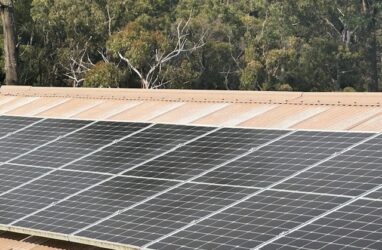Feed aggregator
Texas bill would prohibit GHG emissions tracking
Good boy or bad dog? Our 1 billion pet dogs do real environmental damage
Greens to leverage Snowy Hydro to make rooftop solar PV available for seven million renters
The post Greens to leverage Snowy Hydro to make rooftop solar PV available for seven million renters appeared first on RenewEconomy.
Rooftop solar: Have the “poor” really subsidised the “rich” in Australia?
The post Rooftop solar: Have the “poor” really subsidised the “rich” in Australia? appeared first on RenewEconomy.
The plans to put data centres in orbit and on the Moon
Financials refuse to cut fossil fuel exposure, favour companies with carbon credit strategies -report
ARB offset issuances dip in latest two-week cycle as DEBs units reemerge, YtD lead in new credits narrows
No joke: Climate impacts “not a punchline:” Palau president takes swipe at Dutton
The post No joke: Climate impacts “not a punchline:” Palau president takes swipe at Dutton appeared first on RenewEconomy.
Habitat signed up to provide AI-backed trading for new solar battery in South Australia
The post Habitat signed up to provide AI-backed trading for new solar battery in South Australia appeared first on RenewEconomy.
California lawmakers plead with DOE to preserve hydrogen hub funding
RayGen raises $127m as local solar thermal hopeful prepares for global stage
The post RayGen raises $127m as local solar thermal hopeful prepares for global stage appeared first on RenewEconomy.
Troubled coal plant offline for two months following “blast” days before LNP reveals life extension
The post Troubled coal plant offline for two months following “blast” days before LNP reveals life extension appeared first on RenewEconomy.
University to host ten community batteries to soak up excess solar and be part of virtual power plant
 Ten community batteries to be installed at University as part of federal funding program.
Ten community batteries to be installed at University as part of federal funding program.
The post University to host ten community batteries to soak up excess solar and be part of virtual power plant appeared first on RenewEconomy.
Stronger US policy signals needed to support industrial decarbonisation -panellists
WCI Markets: Quebec lawmakers reaffirm support for province’s cap-and-trade programme, US compliance markets stage recovery
Bowen says design of battery scheme leaves “zero chance” it will increase electricity prices
The post Bowen says design of battery scheme leaves “zero chance” it will increase electricity prices appeared first on RenewEconomy.










